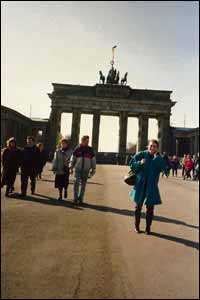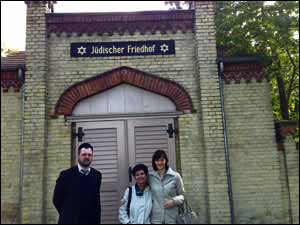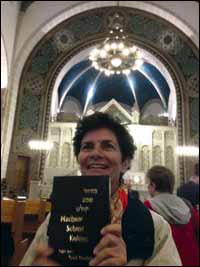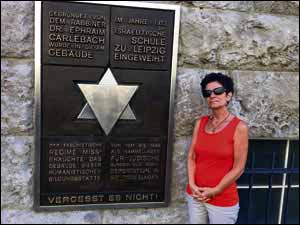|
SUSAN BOOKBINDER Writing was on Wall for hate to return | ||||
They were saying goodbye to their daughter, son-in-law and grandchildren, who were turning their backs on the grimy, grey jail of the ironically-named German Democratic Republic for the alluring promise of freedom and prosperity, behind the heavily fortified wall, which divided East and West Berlin. I was in the springtime of my career. My first national TV job, a researcher on an ITV documentary programme, Eyewitness. As such, we had filmed the East German Schmidt family saying goodbye to one another; weeping grandchildren and parents expecting never to see each other again. History has its cruel twists. Fifty years before that, surrounded by Blackshirts and Nazi guards, my great cousin, Feige Mendzigursky, was also saying goodbye to her family, also not knowing if she would ever see her mother, Frieda, and little sister, Etti Lea, again. I cannot help but think about the jeering, screaming crowds which filled those darkened streets in 1942, as Frieda and Etti Lea were herded into the cattle trucks bound for Riga ghetto in Latvia. Feige, then 14, and her younger sister, Margo, escaped with their lives. They were bound for Manchester and a new life with their cousins, the Bookbinders, having boarded the last Kindertransport train out of Leipzig in August, 1939. In 1989, two generations of Schmidts were following the example of thousands before them. The young East Germans were leaving with only the clothes on their backs, travelling through Hungary to start a new life on the other side of the Wall. We were planning the next day's filming when we had a call from London telling us that a revolution was underway in West Berlin, with thousands assembled at the Brandenburg Gate, chanting and calling for the Wall to come down. The crew and I flew back to London, so that we could fly into West Berlin and get the now iconic shots of thousands of people, armed with small hammers, hacking at the wall until it fell, along with the collapsing communist Eastern bloc. Over the next few days, amid an electrifying atmosphere, we were indeed Eyewitness to history; we saw the wall come down and I was able to drive through Checkpoint Charlie, getting both GDR and DDR stamps on my passport, enabling us to re-unite three generations of the Schmidt family at the Brandenburg Gate. Reunion never came for Feige and the Menzigursky family, as those who could not escape, suffered and perished at the hands of the Nazis. The essence of our documentary-making in 1989 was to capture the mood of the people. I remember being struck by the palpable sense of remorse for the Holocaust among the young West Germans we met. There was a very clear understanding of why the Wall was there and they were not afraid to talk about it. The division of Germany after the Second World War was a direct result of the need to dismantle the Third Reich and everything about Hitler's seat of power in Berlin. These young West Germans of my generation had been fully educated - as part of their national curriculum - to a much higher level than that of many of the people with whom I went to school in England. I remember, as a teenager, being asked why I objected to the wearing of swastika badges and, being told that "you're Jewish -you killed Jesus", to say nothing of regular comments about my father, such as "my dad says your dad is a big, fat Jew".
They were told of an intolerable and impoverished life on the other side of the Wall. Further, they faced certain death from the armed guards in the no-man's land created on the East side of the Wall should they try to escape to sample the other side for themselves. When the Wall came down, there was outrage and anger from the East Berliners, when they could see exactly what they had been denied. The anger was directed at the communist regime that had kept them imprisoned and in the dark, rather than any remaining Jewish communities. So 25 years on, as Feige Mendzigursky prepared to celebrate her 90th birthday in England, her daughter, Judith Elam, visited the graves of the family her mother left behind and those of her father's family in Berlin. Judith was unable to visit the home her mother had been forced to leave in Liepzig in 1939 as it had been bombed. She was however, able to visit the memorial at Carlebach Schule, where Feige went to school. There were no graves to visit of her grandmother, Frieda Mendzigursky, and Etti Lea. They had, it is believed, frozen to death on their way to the ghetto in Riga. In Berlin, Judith made monumental strides in her own personal journey of genealogical discovery, while holding out a huge hand of reconciliation to Germans, facing the hideous discovery of the secret Nazi past of their own relatives. In August, I wrote in the Jewish Telegraph, about Judith's mission and the Stolpersteine (memory stones) project, which had transformed Judith's thinking with regard to Germans. Judith has dedicated the last six years of her life to the project, which involved tracing the names of Jews who vanished, having been taken from their homes and murdered by the Nazis. The project captured the imagination of a group of German residents who placed golden stones, bearing the names of those who had disappeared outside the houses from where they were taken in Berlin. Most of the residents, who worked tirelessly with Judith to honour the thousands of Jews who were taken and murdered, were Germans, some of whom discovered that members of their own family had hidden the fact that they had collaborated with or had been active Nazis. Against this background and my positive experience of young Germans in 1989, I wondered how Judith found Germans and their attitude to Jews today. Amazingly, Judith told me that she felt more at home in Germany than in England, because of the Stolpersteine dedicated to her family members, the references to them in the Jewish museum and the graves she was able to visit.
However, it was the visit to the grave in Oranienburg of Judith's great-great-great-aunt Miriam Steinberg, born Hirschberg, which shone a chilling light on the insidious reality facing Jews in Berlin right now. The Chief Rabbi of Brandenburg, Shaul Nekrich, accompanied Judith and her friend Ines Gurscke, one of the 'Stolpesteine family' to the Jewish cemetery. "He recited a prayer and a beautiful blessing, it was so moving," Judith told me. But she also noticed that until they reached the cemetery, Rabbi Shaul had kept his yarmulke hidden under a baseball cap. In no uncertain terms, he reiterated to Judith the advice he gives to all Jews, not to wear visible signs of Judaism on the streets of Berlin. Experts say we are witnessing the worst antisemitism seen in Germany since the Nazis. This summer, molotov cocktails were thrown into the Bergische synagogue in Wuppertal - previously destroyed on Kristallnacht. There were calls from the Berlin imam, Abu Bilal Ismail, to "destroy the Zionist Jews . . count them and kill them, to the very last one". Bottles were hurled through the window of an antisemitism campaigner in Frankfurt; an elderly Jewish man was beaten up at a pro-Israel rally in Hamburg; and an Orthodox Jewish teenager was punched in the face in Berlin. In several cities, chants at pro-Palestinian protests compared Israel's actions to the Holocaust. Other notable slogans included: "Jew, coward pig, come out and fight alone" and "Hamas, Hamas, Jews to the gas". There is little doubt that the conflict in Gaza is breathing new life into some old and ugly, demons. Police and Jewish civil rights organisations have long observed a noticeable spike in antisemitic incidents each time the Israeli-Palestinian conflict flares. What is also worrying, is the unashamed, middle class, intellectualisation of antisemitism which would have been unacceptable among the young Germans I met in 1989. A study last year by the Technical University of Berlin found that out of 14,000 hate-mail letters, emails and faxes sent over 10 years to the Israeli embassy in Berlin and the Central Council of Jews in Germany, 60 per cent were written by educated, middle-class Germans, including professors, lawyers, priests and university and secondary school students.
Sadly the internet and technology which, in many ways, has freed the world, has inflamed and mobilised extremism and hatred. We have seen so many horrifying images and Twitter hashtags, including #HitlerWasRight. Young people are being indoctrinated and radicalised by this new form of propaganda, which, on social media in particular is unchecked and unregulated. So the celebrations of the Wall coming down have mixed emotions for me. Has this freedom created space for a hideous old hate to resurface and mix with a new energy of extremism? I have to leave the last word to my cousin, Judith. How does she feel about Germans today? "I really began to empathise with today's Germans when I was standing on a bridge with Oliver Geiger, who had pioneered the Stolpesteine project. "He had pointed out this beautiful old building that he had always loved, but that now he could no longer do so, because he had found out it was tainted with some Nazi connection. "When he said 'Now I can't even love that building anymore, there is nothing left' - I realised that we Jews must take Germans by the hand and say, 'We will never forgive, we will never forget, but we must move forward together so that Germans today can get their national pride back and feel they can fly the German flag without being branded as a Nazi'." If that is not reconciliation, I don't know what is.
E-MAIL: comment@jewishtelegraph.com
|



